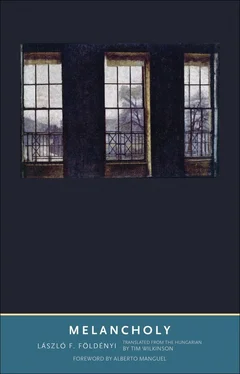That is how bloodthirsty despots and cowardly melancholics go hand in hand. The strong and the weak were sustained by the same insight, and their state was due to the same — frequently unformulated — interpretation of being, which to an external observer appeared very different. 11The cowardice of a melancholic is not the same as cowardice in its everyday sense. It would be more to the point to call it powerlessness, since it is not purely out of cowardice that melancholics fail to act, but out of their inability to commit themselves to taking a step. Others simply call them cowards, but because of a deep-lying kinship, they are no more cowardly than a bloodthirsty despot; they simply attend to other things . (Richard III’s true partner is not so much Claudius as the other melancholic, Hamlet.) Of course, a melancholic’s weakness cannot be denied, but it is a consequence of the fact that melancholics, who crave absolute autonomy and who, having completely lost their bearings, are the center of the world (God is intangible— inattingibilis —Cusanus says), are solitary and can count on themselves only. They would like to be almighty, but their solitude makes them fragile; they feel that wherever they tread, the invisible vault of the void will fall down on them. “It is, therefore, no strange anomaly partly to will and partly to be unwilling. This is actually an infirmity of mind,” says St. Augustine ( Confessions , bk. 8, 9); the other St. Augustine, this time the one invoked by Petrarch, says to his interlocutor about the latter’s permanent fear of death and contempt for the world:
You never commit your full attention to anything. And so whenever your mind, which is by nature noble, has arrived at the thought of death and at other thoughts that might direct it toward life, and is through its natural acumen delving into the most profound things, it isn’t strong enough to stand there, and as the turmoil of various problems assault it, the mind turns back. And so the healthy resolve shatters to pieces from excessive mobility, and there arises that internal discord about which we have already spoken at length, and the anxiety of a soul angry with itself.
(Petrarch, Secret , 1st dialogue, 69–70)
Ficino wrote in a similar strain in an undated letter to his good friend Cavalcanti: “At present I do not really know what I want; it may be that I do not really want what I know and want that which I do not know. The malicious influence of my Saturn retrogressing in Leo has denied me the security granted to you by the salutary effect of your Jupiter progressing in Pisces” (Ficino,
Epistolae
, vol. 2, letter 22).
Solitude results in weakness, and that weakness in turn leads to indecision and permanent hesitation. Whatever such a person does, the consequences of his acts spiral off in an unknown direction, depriving him of innumerable further possibilities. Acedia, or apathy, did not correspond in the Renaissance with what it denoted in the Middle Ages: back then, it meant the rejection of the self’s possibilities in the eyes of others, nonmelancholics, whereas later it was more the consideration of possibilities. In medieval miniatures and in the illustrations of almanacs, the melancholic is usually asleep; the soul as well as the eyes are closed. From the fifteenth century onward, the melancholic is no longer sleeping but ruminating: brooding, straining his attention. According to astrology, Saturn acts as an aid to contemplation. In the Middle Ages, the vita contemplativa was held in great esteem (especially in Dominican circles) because it was directed, first and foremost, at God. Medieval contemplation was an intense, protracted inspection of the world proclaiming the glory of God. The vita contemplativa was, in fact, a contemplatio Dei , a contemplation of God — and the recognition of divine rationality was nothing other than dedicating oneself, body and soul, to the service of an ostensively superior being. Contemplation promoted the acceptance of existence, so from the outset, a man of contemplation took cognizance of given boundaries and limits, conformed to tradition, and stood far away from all kinds of independent action or creativity as it is understood nowadays. 12Medieval contemplation (or at least its proper measure and scale) excluded melancholia: anyone who became melancholic had gone mad in the contemplation not of God but of his own sinful ambition. By contrast, the trap of melancholia was inherent in modern contemplation. Contemplation was no longer a matter of observing but of reflecting. If I am at the center of the universe, then I relate everything to myself: the world is, indeed, the way I see it. Existence is not inherently rational, but is given meaning by humans: it has not been justified but awaits justification, even re-creation, in much the same way that Dürer’s brooding St. Jerome tries, not in the least self-confidently, to think everything through anew. In the sketches for the etching, experimental devices can be seen over Jerome’s head: alongside the pensive scholar’s books are chemical retorts and flasks. 13Contemplation does not preclude practical activity; indeed, brooding and action presuppose each other, like the weak, cowardly melancholic and the tyrant with blood on his hands. 14The vita activa and the vita contemplativa are interconnected, since by an active life one does not understand hustling, bustling, and fussing around. An individual left to himself broods because he has to make a choice; a foundation for his life (and not just in the financial sense) can be produced only by deciding and acting. The conditions of self-realization include contemplation as much as readiness to act. Consequently, people who on occasion shrink back from action are not really cowardly: they are reserving themselves for something else. As has been seen, however, the attempt to realize perfect autonomy, as it presents itself naturally to everyone, is doomed to failure; vacillating between heaven and earth, one will be obliged either to throw oneself into the arms of religion or to reconcile oneself to worldly existence. One is compelled by one’s own weakness, which demands either belief or justification —and people wishing to realize themselves as God, for all their audacity, are weak and lacking in support. Melancholics of the Renaissance era — the figures in the portraits, the heroes of vengeful tragedies, the brooders — are incapable of believing in God, however much they might want to, but they are also unable to form an alliance with the world. They want to realize themselves and to accept their uniqueness, their unrepeatability, the fact that it does not lie in their power to relive their lives — yet that self-evident pretension expels them not only from the heavens but also from the world below. That is hell. They banish themselves into the void, where they cannot hope for anything, where life becomes an eternal now , a single enduring moment. It was granted for melancholics of the Renaissance era to be perfectly sovereign, but the price they had to pay for that was inner destruction, which, in the last analysis, made sovereignty impossible .
In a nearly forgotten, strange discourse, Charles de Bovelles wrote at length on nothing ( Libellus de nihilo , 1510). Experiencing nothingness had become more excruciating for him than anything, and on that account it had to be differentiated from nonexistence, which at least can cause no pain: “Every existing thing is an existing something. Everything is full of being. The void is empty, indifferent, soulless. Void is outside complete being. Consequently, the assertion ‘Nothing is not nothing’ has two interpretations: one of those is negative, the other is declarative and affirmative. Both reveal the same truth and are equivalent. In other words, if we state that Nothing is not nothing, or that Nothing is not nonexistence, then we are saying that Nothingness is not nonexistence, or if you prefer; the existing nothing is not nonexistence” ( Libellus de nihilo , bk. 1). Only that “existing nothing” can be looked on as the basis of “existing being,” the foundation of material: “Material is an unfinished and imperfect existing, potential being. . Material is the beginning and end of existing beings. . And the substrate of the material is nothing. Material is the basis of everything, but itself it dissolves into, rests on, nothing” (ibid.). It follows from this, Bovelles could assert, that material is not being and not not-being, but “empty and free of every distinction” (ibid.). But because material, as Bovelles himself recognized, is not only the beginning but also the end of everything, the nothing that is “embodied” in material can permeate everything that there is. “Nothing is the receptacle of every creature, which is always present and in which they are. . Everything is therefore based on nothing: the full is in the void, being rests on nonbeing” (bk. 6). Nothing, therefore, does not surround existence, says Bovelles, anticipating Heidegger; it is not beyond it but homogeneous, though not identical, with it: “Nothing does not disappear in front of creatures but coexists with them” (ibid.).
Читать дальше












